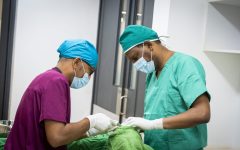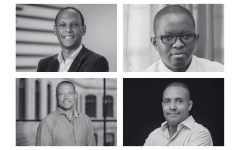Student Profile: Leah Blezard MGHD ’19
May 31, 2019 2019-05-31 10:20Student Profile: Leah Blezard MGHD ’19
Canadian student, Leah Blezard MGHD ‘19 first heard about UGHE through social media. Initially drawn to Partners In Health’s mission to help build equitable health systems, Leah took a chance on her passions for poverty alleviation and health equity and applied for UGHE’s Master of Science in Global Health Delivery program. A year later, she finds herself surrounded by a cohort of aspiring global health leaders, engaged in community projects in rural Butaro, and thinking about her next step on the African continent. We caught up with Leah to reflect on her experience and goals.
Can you describe where you grew up? What were some of your earliest exposures to global health?
I moved all over Canada throughout early elementary school, living in rural, northern communities. I spent most of my childhood in a small industrial town called Quesnel in northern British Columbia (BC), a blue-collar place full of great, hard-working people, but very little diversity. From an early age, my parents instilled in me a sense of curiosity for other countries and other people and in Grade 6, I had an amazing teacher who supported our class in fundraising efforts for the Canadian development charity, WE Charity (formerly Free the Children). These experiences introduced me to global issues such as poverty and health inequity, and I knew I had found my calling. I have known that I want to be a doctor from a very young age—a goal which I am still pursuing—but this experience in Grade 6 cemented my desire to specifically serve vulnerable populations who bear the world’s greatest burden of disease and lack access to direct services.
Can you give a brief overview of your professional and academic background prior to UGHE?
Before coming to UGHE, I worked as the Nutrition Program Director in Zambia for a small Canadian non-profit organization called The SAM Project (“Sustainability through Agriculture and Microenterprise”). It is a great organization that is committed to community collaboration—all of the projects are identified and driven by community members themselves. The organization simply serves as a resource or tool.
I ran the nutrition program, which aimed to provide local caregivers of young children with a platform to learn about best feeding practices and collaborate with other caregivers through regular nutritional support groups in their communities. The nutrition program also encompassed microenterprise initiatives and feeding programs, reflecting the multi-faceted nature of malnutrition. I served in this position while simultaneously finishing my undergraduate degree in International Development Studies at McGill University, and it was an incredible way to apply the things I was learning in lectures to real life scenarios.
What inspired you to apply to UGHE’s Master of Science in Global Health Delivery program?
I was introduced to Paul Farmer’s work during my undergraduate studies. The first book I read by him was “Infections and Inequalities” and it truly floored me. I had never come across such a logical, eloquent, and social justice-driven explanation of poverty and health inequity. Naturally, I wanted to learn more, and quickly became aware of a Partners In Health fundraising chapter at McGill. Through this exposure, and through following PIH on social media, I eventually learned about UGHE and the MGHD. I kept it in the back of my mind to pursue when the timing was right, which ended up being this year.
What skills and experiences are you learning from the MGHD program? Are there aspects you find challenging or rewarding?
The MGHD program heavily emphasizes group-work in all of our major assignments and deliverables. I have always been a perfectionist, thus group work is a personal challenge for me as it requires one to listen and relinquish some control. Discussion, collaboration, and ultimately compromise is necessary. Navigating group dynamics can be challenging, but it is the name of the game in the global health sector, which requires cross-cultural collaboration. You are not always going to agree with those around you, especially if the group is comprised of varied cultural backgrounds and experiences. Therefore, learning diplomacy and how to work effectively in diverse teams is a skill—the MGHD definitely sets us up for that.
One of the most rewarding parts of this experience has been meeting the most incredible global health leaders on the planet, face-to-face, and taking the opportunity to converse with them. These individuals have made a positive impact on the world, and learning from them as our professors and mentors is an experience I’m convinced I would not find anywhere else. Additionally, learning about health inequity and implementation science within a rural setting has been a truly immersive experience and has given me time for deep reflection on the contributions I would like to make to the world.
What has been your favorite UGHE class so far?
I loved the content of “Principles of Global Health Equity.” It was an overview of global health, covering a huge array of topics from One Health to community health worker networks to the history of colonial medicine. Our lecturers for that course were incredible and possessed a great depth of experience. I also loved “Management of Global Health Care Delivery” because our professor, Dr. Rex Wong is a great educator. He made daunting concepts like accounting and health finance compelling and relevant. The overall blend of courses one takes during the MGHD is a perfect combination of technical skills and thought-provoking content.
What would you say to someone interested in applying to UGHE’s MGHD program?
Being part of an international cohort (there are 24 people in our class, from 11 different countries) is a learning experience unlike any other. There is also a lot to be said for the value of studying global health while living in a rural community that experiences health inequities.
Rwanda is a leader in health care policy and health systems strengthening, and being immersed in this context, rather than a lecture hall in the middle of Toronto, is unprecedented for global health programs. Learning from the front-lines not only makes sense, but is a model that should be replicated across the world. Any student looking to pursue global health studies should consider this program if they are truly interested in an immersive experience driven by organizations that have led the movement in addressing such global health issues. Rwanda’s Health System, Partners In Health, and the University of Global Health Equity are doing just that.
What would you like to do after you graduate in August?
I will be applying to medical school within the next year or so. Ultimately, I hope to have a career that involves both clinical work as a physician and programmatic and policy work as a health advocate. I believe this blend would allow me to conduct truly meaningful work; having direct impact as a clinician, but also affecting change at a population-level.
In the meantime, I’m hoping to work on the African continent for a global health organization whose vision and values are aligned to my own. I am especially interested and committed to advancing women’s sexual and reproductive health and rights as I believe this is an issue in need of attention everywhere across the globe. I am also interested in the intersection of climate change and population health, as well as programs that strengthen the technical capability of community health worker networks. I have many interests that energize and excite me, and look forward to channeling them with the tools the MGHD has equipped me with!







